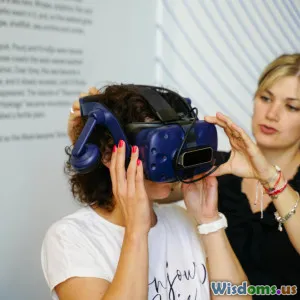
The Future of Personal Health Data
8 min read Explore the evolving landscape of personal health data and how it shapes our future healthcare experience. (0 Reviews)
The Future of Personal Health Data
In an era where the volume of data generated grows exponentially, personal health data stands out as one of the most promising frontiers of technological innovation and societal transformation. Imagine a world where your smartphone and wearable devices not only count steps but provide your healthcare provider real-time, actionable insights to predict and prevent illness before symptoms arise. This isn't science fiction—it’s the reality rapidly unfolding because of the convergence of advanced technologies, healthcare innovation, and shifting societal attitudes toward data privacy and ownership.
Understanding Personal Health Data
Personal health data encompasses everything from electronic medical records (EMRs), wearable device outputs (like heart rate, sleep patterns), genetic information, lifestyle logs, and increasingly, even environmental data impacting one's health. This data forms a comprehensive health fingerprint unique to each individual.
Current Landscape: The Data Explosion
According to a study published by IBM, healthcare data doubles every 73 days, driven by new diagnostic tools, wearables, and telemedicine. Wearable technology market data shows estimates of over 500 million connected health devices globally by 2025, including smartwatches, fitness trackers, and medical-grade sensors. As more people adopt these devices, richer datasets are created that offer unprecedented insights—provided the data is intelligently collected, curated, and utilized.
Technological Innovations Shaping the Future
Artificial Intelligence and Predictive Analytics
AI algorithms trained on large datasets can identify patterns invisible to the human eye. For instance, Google's DeepMind demonstrated how machine learning models could identify over 50 eye diseases from scans with human-level accuracy. By applying similar techniques to aggregated personal health data, healthcare providers can predict chronic disease risks, optimize treatments, and customize interventions.
Blockchain for Data Security and Ownership
Given the sensitivity of health information, data privacy is paramount. Blockchain technology introduces a decentralized ledger system, empowering patients to control who accesses their data—reducing breaches and unauthorized exploitation. Startups like Medicalchain are already using blockchain to create secure health records, giving patients the ownership stake traditionally missing from healthcare data transactions.
Integration of Genomics and Personalized Medicine
The cost of whole-genome sequencing has significantly dropped—from nearly $3 billion in 2003 to under $600 today. By integrating genomic data with other personal health information, physicians can tailor medications and lifestyle advice to an individual’s unique makeup, dramatically improving efficacy and reducing side effects.
Remote Monitoring and Telehealth
The COVID-19 pandemic accelerated telemedicine adoption, reshaping healthcare delivery. Remote devices can transmit real-time data to clinicians, enabling continuous monitoring of conditions such as diabetes, hypertension, and even mental health. This technology reduces hospital visits, improves patient engagement, and lowers healthcare costs.
Ethical and Privacy Challenges
With great opportunity come complex challenges.
Data Privacy
Data breaches are rife in the healthcare sector—IBM’s 2023 report noted that healthcare accounts for nearly 25% of all data breaches globally. Balancing data utility with privacy necessitates robust encryption, strict regulations, and transparency about data use.
Ownership and Consent
Who owns personal health data? Traditionally, healthcare providers hold patients’ records. The future, however, demands models where individuals have sovereign control, deciding how and when their data is shared. Dynamic consent frameworks, allowing real-time revocation or modification of consent, are being proposed to empower patients.
Bias and Inequality
AI models often reflect biases present in training data—leading to inequities in diagnosis or treatment. Ensuring diverse, representative datasets and transparent algorithms becomes critical to prevent exacerbating health disparities.
Real-World Applications and Impacts
Empowering Patients with Apps and Platforms
Platforms like Apple HealthKit and Google Fit collect data from users and integrate it with electronic health records. This consolidation enables patients to better understand their health metrics, track progress, and share data directly with practitioners, fostering collaborative care.
Public Health and Epidemiology
Aggregate anonymized health data enables disease outbreak prediction and control. For example, during the COVID-19 pandemic, data from wearable devices helped predict infection surges days before testing stats confirmed them, enabling earlier interventions.
Insurance and Wellness Programs
Health insurers are beginning to use personal data to design customized premiums and incentives to promote healthy behaviors. While controversial, this could transform insurance from reactive cost coverage to proactive health management.
Looking Ahead: What Can We Expect?
The convergence of personalized data with rapid technological advances points toward a future where healthcare is more predictive, personalized, preventative, and participatory, often referred to as P4 medicine.
Smart, Interconnected Ecosystems
Future healthcare will operate through interconnected ecosystems combining data from home devices, pharmacies, clinics, research databases, and even smart cities. This synergy will enable highly granular insights and more efficient care pathways.
Regulatory Evolution
Governments and international bodies are expected to implement nuanced policies balancing innovation with ethics—mandating interoperability standards while protecting citizens’ privacy.
Enhanced Patient Agency
The shift from healthcare as a reactive service to an interactive, continuous partnership will place the individual at the center. Patients will be active managers of their health data portfolios, making informed choices supported by AI-powered health advisors.
Conclusion
The future of personal health data promises transformative opportunities—improving patient outcomes, advancing medical research, and creating a more equitable healthcare system. However, realizing this future requires careful stewardship of data privacy, equitable technology design, and patient empowerment. By embracing these principles, individuals and institutions alike can harness the incredible potential of personal health data to foster a healthier, smarter world.
References:
- IBM Healthcare Data Management Study, 2023
- DeepMind Eye Disease Study, Nature, 2019
- Genome sequencing cost analysis, National Human Genome Research Institute, 2024
- Medicalchain blockchain health record project
- Apple HealthKit and Google Fit user statistics 2023
- IBM Security Report on Healthcare Data Breaches, 2023
Rate the Post
User Reviews
Popular Posts



















